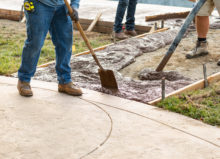Expected Lifetime of a Concrete Driveway
A professionally installed driveway protects your vehicle, updates your curb appeal and offers a safe, convenience place to walk. The most common driveway materials are concrete and asphalt, while some driveways are made of gravel or dirt. Discover how long you can expect a new concrete installation to last and other advantages of choosing this material. Be sure to work with a professional team for a long-lasting addition to your home.
Average Lifetime
Most residential concrete driveways last between 25 and 30 years. Proper maintenance can help yours last up to 50 years. This timeline depends on the installation techniques, the amount of use and any maintenance steps you may take. Review each factor to see how you can get the most out of your driveway investment.
Enjoy a longer driveway lifetime with our professional services at G&G Concrete & Construction. We offer these maintenance services to promote a safe, long-lasting structure:
- Reinforced outer layer: Avoid chips and cracks around the edges of your driveway by investing in our reinforcement services. We use a concrete mixture on the outer layers that is designed to reinforce the edges and prevent chunking or chipping.
- Stress crack repairs: Temperature changes, heavy loads and natural settling can all cause stress cracks. Hairline cracks expand at a rapid rate, so it’s important to work with a local concrete team to fill all sizes of cracks.
- Pothole fills: A pothole can cause serious issues over time. These holes allow water and contaminants to penetrate to deeper and deeper layers of your concrete driveway, eventually leading to foundation damage. A large pothole can also damage your vehicle.
In addition to these professional tasks, consider a few DIY projects to increase the lifetime of your driveway. Frequently sweep the surface to remove debris. Plow snow and road salt off the surface to avoid moisture issues caused by freezing and thawing.
Advantages of Concrete
Concrete offers a more durable, customizable and heat-resistant surface compared to asphalt. Choose a concrete driveway to enjoy a rugged surface that can take heavier loads than asphalt. If you drive a full-size truck, motorhome or other heavy vehicle on your driveway, concrete is a great option.
This material is also surprisingly customizable. Compare the single, monotone look of asphalt with the range of stamped concrete colors and textures to see how a concrete driveway surface can better match your home or landscaping.
Finally, concrete withstands high temperatures better than asphalt. Direct sunlight in summer can soften asphalt and cause it to deform as you drive on it. Concrete holds up to high heat without affecting its weight rating or surface.
Factors That can Reduce the Lifetime
There are a number of ways that your concrete driveway may become damaged or unusable before you reach the 20, 30 or 50 year mark. Watch out for these factors as you look for an installation team and plan your new driveway:
- Improper foundation
- Unprofessional installation
- Excessive weight
- Lack of cleaning
Unfortunately, an improperly prepared foundation can quickly cause your concrete driveway to crack and break apart. This will require complete removal and preparation of a brand-new foundation, so it’s important to work with a leading concrete team in your area. Prepare a professional foundation in the first place to enjoy 20 or more years of smooth driving and safe parking.
When you see extensive cracks that are connected or severe pitting, it may be time to replace the entire driveway. Other signs include drainage issues, large potholes and uneven sloping. Discuss the issues with our team at G&G Concrete & Construction to determine whether you need a repair service or a complete driveway replacement project.








